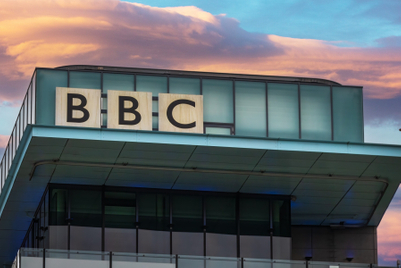.png&h=570&w=855&q=100&v=20250320&c=1)
Amid the rise of connected TV (CTV), traditional linear channels are in decline, forcing players within the space to find creative solutions to maintain their audiences. For the BBC, iPlayer has served as its answer to competing CTV offerings like Netflix, Disney+, Amazon Prime, and more.
However, CTV itself isn’t immune to problems. The abundance of streamers, channels, and consumption mediums has left audiences fragmented, making them harder to pin down—arguably leading to the rise of advertising solutions like retail media.
CTV itself has seen creative advertising solutions implemented to win over consumers in an increasingly competitive market. Namely, several streamers recently launched both ad-supported and ad-free tiers, as well as Netflix’s option for brands to purchase ad buys on its platform.
The BBC has been left somewhat stuck in the crosshairs—caught between being a linear TV channel and a streaming service. According to the BBC, its TV licence accounted for roughly 65% of its income in 2023, amassing £3.75 (US$4.75) billion of its £5.73 (US$7.26) billion total income.

As it trials a series of strategies to generate new income streams, including a partnership that sees Disney sponsor its popular show Doctor Who, the UK Government announced a £10.50 (US$ 13.30) increase in price for the BBC’s TV licence from £159 (US$ 201) to £169.50 (US$ 214.73) a year as of April 2024.
It has also stated that a review of both the licence and “alternative funding options” is ongoing, as well as a plan to “radically transform and renew” its online offerings, which could potentially see the licence scrapped altogether.
‘It's important to ensure that accompanying ads are both relevant and personalised to resonate with the target audiences.’
 Paul Briggs, SVP Europe at Silverpush
Paul Briggs, SVP Europe at Silverpush
On the potential impact among audiences and advertisers, Paul Briggs, SVP Europe at Silverpush, said: “The plan to ‘radically transform and renew’ is a huge step in the right direction to build sustainable growth beyond the public purse. The key is how it's going to engage with an ever-changing audience that’s getting younger and potentially sceptical about the TV licence as more channels become available.
“The BBC’s impact, in terms of content and loyalty, is unmatched, but with the revision of the licence fee, they need to translate these advantages into profit by looking at how advertising revenues can support this.
“This potential success closely aligns with audience engagement with the BBC’s plans to boost online with its British content; it's important to ensure that accompanying ads are relevant and personalised to resonate with the target audiences. Which is why we’re seeing the likes of ITV and Sky invest in contextual advertising—the BBC can do this on a global scale.”
 Liz Duff, Head of Commercial and Operations at Total Media
Liz Duff, Head of Commercial and Operations at Total Media
Liz Duff, head of commercial and operations at Total Media, added: “For the BBC to survive for another century it needs to break out of some habits and modernise its offering to compete with newer players in the market. Whilst content should always be to the benefit of the public that funds it, a different commercial model shouldn’t need to stray from its original mission.
“For advertisers, you can’t do better than to partner with a trusted and globally recognisable media entity, with an opportunity to be in front of premium brand-safe content.”
‘Ad-supported options to access BBC content would plug this budget hole.’
 Guy Meyers, regional director of customer success, EMEA, Recurly
Guy Meyers, regional director of customer success, EMEA, Recurly
Regarding alternative funding solutions, experts have posited several solutions, some inclusive of the TV licence and remaining public, and some abandoning it altogether in favour of a commercial approach.
Guy Meyers, Regional Director of Customer Success—EMEA at Recurly, said: “Many streaming services have turned to ad-supported offerings to keep their prices competitive and maintain strong revenue, and the BBC could follow suit.
“Many consumers are happy to accept a small number of ads in their content in return for a reduced price, as has been seen with the success of Disney+’s low-cost, ad-tier offer. As the BBC [potentially] begins to turn away from the mandatory licence fee as a revenue stream, advertisers are likely to fill the gap left in its place. Ad-supported options to access BBC content would plug this budget hole.
“For advertisers, this would represent a unique opportunity to advertise on a platform that has never seen commercial ads before, providing a real first-mover advantage for fast-moving brands.”
‘There is a right way and a wrong way to go about it.’
 Geoff de Burca, Chief strategy officer, EssenceMediacom
Geoff de Burca, Chief strategy officer, EssenceMediacom
Geoff de Burca, chief strategy officer at EssenceMediacom, offered an alternative view. He said: “It’s clear right now that the whole [TV] sector, both public and commercial, is finding it tough in the current economic environment, and so it’s understandable why the BBC wants to be commercial.
“There is a right way and a wrong way to go about it. Increasing advertising or sponsorship within their core AV, audio, and digital channels may seem superficially attractive—increasing supply would almost certainly combat media inflation—but this would be a short-termist approach. Taking advertising revenue away from commercial broadcasters and publishers would reduce the money available to invest in content, therefore eroding their ability to compete for audiences effectively with the BBC.
“It’s clear much of the targeted growth in income for BBC Studios announced today will come from smart partnerships with overseas-based content producers, such as the existing deals between Disney+ and Doctor Who and between Discovery and the BBC’s Natural History Unit.
“There are also clear opportunities to further extend the commercial use of their talent and IP outside of their core channels, for events, for co-branded products and in marketing – there are many brands who would salivate at the idea of working with some of the BBC’s biggest shows.
“Commercialising the BBC is an understandable direction for the corporation. But to protect reputation and output quality it has to have proper guard rails around it.”
Conversely, Briggs concluded: “Just like the old adage of ‘if you build it, they will come’, brands will invest in the BBC where possible. This is now more important than ever in an era where brand safety is paramount. Having a presence on a well-respected channel such as the BBC is a huge advantage for a brand’s reputation.
“In more ways than one, this is a recipe for success for the BBC, as long as they match their loyalty and content with relevant and engaging advertising.”



.jpg&h=334&w=500&q=100&v=20250320&c=1)


.png&h=334&w=500&q=100&v=20250320&c=1)





.png&h=334&w=500&q=100&v=20250320&c=1)


.jpg&h=268&w=401&q=100&v=20250320&c=1)

.png&h=268&w=401&q=100&v=20250320&c=1)


